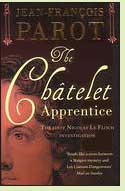The Châtelet Apprentice
by Jean-François Parot
Reviewed by David Maclaine

The Châtelet Apprentice of this novel's title is a fledgling policeman named Nicolas Le Floch, who investigates a series of disappearances and murders in the Paris of 1761. These sensational events are eventually explained with sufficient clarity. It was, however, a different mystery that impelled me through the pages and which baffles me still. I had hoped to solve the puzzle of how this novel came to be published, first in France, then in translation in England, and to give rise to a whole series that now includes five novels. Surely readers are necessary to keep an author employed, and I couldn't imagine many others in my position who would begin the work out of a sense of professional duty, and persevere to the end out of a dogged determination to see if it ever got better.
Although the novel shows shockingly poor craftsmanship,The Châtelet Apprentice is not without virtue. It offers some vivid scenes of the streets of Paris and its suburbs in the age of King Louis XV, and includes loving descriptions of how some choice dishes were prepared. But it lacks the usual prerequisites for success: a basic command of storytelling technique and a central character with whom the reader can sympathize. The narrative lurches from scene to scene; Le Floch's transformation from utter tyro to competent apprentice is told in sketchy summary; and the background mystery of his origins is absurdly easy for the reader to guess, so that Le Floch's inability to figure it out casts doubt on his mental faculties. The plot consists of a steady barrage of surprises, and in that respect alone resembles the work of Raymond Chandler. But Chandler's sometimes-hyperactive plots play out against the rock-solid viewpoint of Philip Marlowe, and Le Floch, a youth who lacks anything like a distinct personality, is no Marlowe. (2000, 403 pages)
More about The Châtelet Apprentice at Powell's Books or Amazon.comOther mystery novels set in Paris:
The Cavalier of the Apocalypse by Susanne Alleyn (2009), about a penniless writer in Paris on the eve of the French Revolution who becomes the chief suspect in a murder investigation after he discovers a corpse in a graveyard; #3 in the Aristide Ravel mystery series (a prequel to Game of Patience and A Treasury of Regrets). See review or more info at Powell's Books.
For the King by Catherine Delors (2010), a thriller about a Paris police inspector who must hunt down the conspirators involved in a bloody assassination plot against Napoleon. See review or more info at Powell's Books.
The Black Tower by Louis Bayard (2008), a thriller about a French police detective in 1818 who suspects that the son of Louis XIV and Marie Antoinette, believed to have died after the Revolution, may still be alive. See review or more info at Powell's Books.
Nonfiction about Paris in the time of King Louis XV:
Louis the Beloved: The Life of Louis XV by Olivier Bernier (1984). More info
Madame du Barry: The Wages of Beauty by Joan Haslip (1992), about Louis XV's mistress. More info
France Under Louis XV by James Breck Perkins (1897). More info
Online:
Louis XV at the BBC History website
Back to Novels of the Eighteenth Century
Back to Directory of Book Reviews